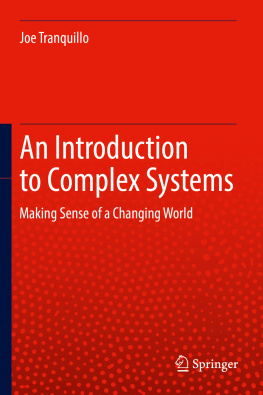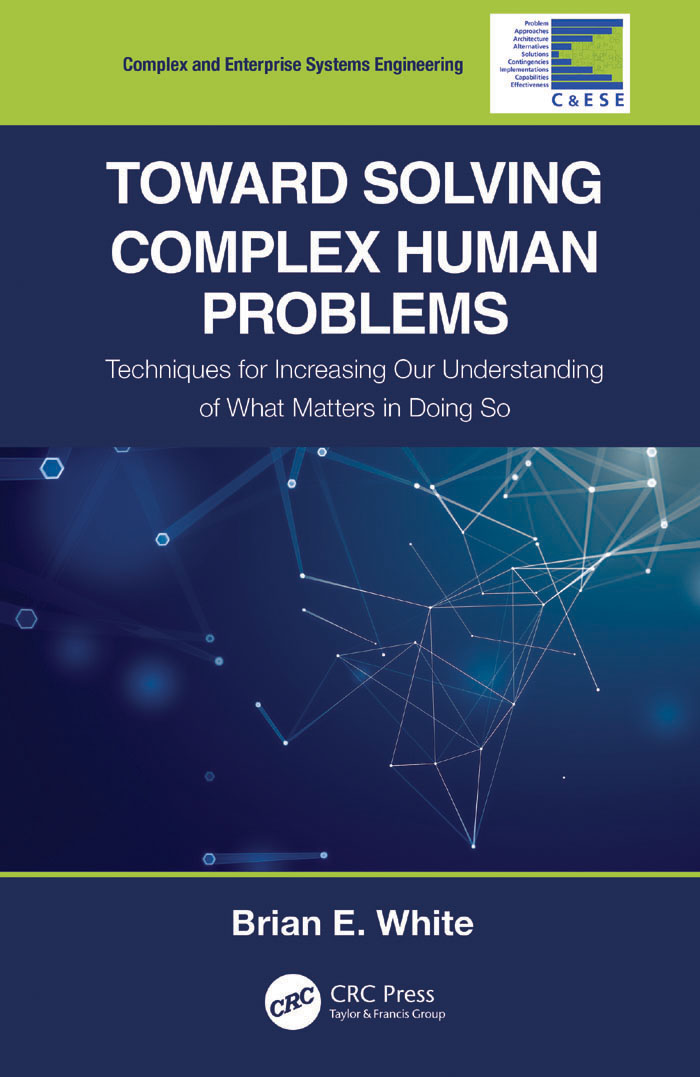Contents
Contents
TOWARD SOLVING
COMPLEX HUMAN
PROBLEMS
Techniques for Increasing
Our Understanding of What
Matters in Doing So
Brian E. White

TOWARD SOLVING COMPLEX
HUMAN PROBLEMS
Complex and Enterprise Systems Engineering
Series Editors: Dr. Paul R. Garvey of The MITRE Corporation and Dr. Brian E. White of CAU-SES (Complexity Are UsSystems Engineering Strategies)
These books represent evolving perceptions of complexity, complex systems, and complex systems engineering, including those associated with most systems, system of systems, and enterprises. One of the most recent characteristics and advocated guidelines is to intentionally and inherently include all the key stakeholders as integral components of the system being developed or improved.
Optimal Enterprise: Structures, Processes and Mathematics of Knowledge, Technology and Human Capital, Forthcoming
Mikhail Belov, Dmitry Novikov
Toward Solving Complex Human Problems: Techniques for Increasing Our Understanding of What Matters in Doing So
Brian E. White
Evolving Toolbox for Complex Project Management
Alex Gorod, Leonie Hallo, Vernon Ireland, Indra Gunawan
Case Studies in System of Systems, Enterprise Systems, and Complex Systems Engineering
Alex Gorod, Brian E. White, Vernon Ireland, S. Jimmy Gandhi, Brian Sauser
Leadership in Chaordic Organizations
Beverly G. McCarter, Brian E. White
Enterprise Systems Engineering: Advances in the Theory and Practice
George Rebovich, Jr., Brian E. White
Engineering Mega-Systems: The Challenge of Systems Engineering in the Information Age
Renee Stevens
Architecture and Principles of Systems Engineering
Charles Dickerson, Dimitri N. Mavris
Model-oriented Systems Engineering Science: A Unifying Framework for Traditional and Complex Systems
Duane W. Hybertson
Designing Complex Systems: Foundations of Design in the Functional Domain
Erik W. Aslaksen
For more information about this series, please visit: https://www.routledge.com/Complex-and-Enterprise-Systems-Engineering/book-series/AUECOMENTSYS
First edition published 2021
by CRC Press
6000 Broken Sound Parkway NW, Suite 300, Boca Raton, FL 33487-2742
and by CRC Press
2 Park Square, Milton Park, Abingdon, Oxon, OX14 4RN
2021 Taylor & Francis Group, LLC
CRC Press is an imprint of Taylor & Francis Group, LLC
Reasonable efforts have been made to publish reliable data and information, but the author and publisher cannot assume responsibility for the validity of all materials or the consequences of their use. The authors and publishers have attempted to trace the copyright holders of all material reproduced in this publication and apologize to copyright holders if permission to publish in this form has not been obtained. If any copyright material has not been acknowledged please write and let us know so we may rectify in any future reprint.
Except as permitted under U.S. Copyright Law, no part of this book may be reprinted, reproduced, transmitted, or utilized in any form by any electronic, mechanical, or other means, now known or hereafter invented, including photocopying, microfilming, and recording, or in any information storage or retrieval system, without written permission from the publishers.
For permission to photocopy or use material electronically from this work, access
Trademark notice: Product or corporate names may be trademarks or registered trademarks, and are used only for identification and explanation without intent to infringe.
ISBN: 978-0-367-63848-1 (hbk)
ISBN: 978-1-003-12098-8 (ebk)
Typeset in Times New Roman
by MPS Limited, Dehradun
To
Beverly Gay McCarter
In humble recognition of Bevs past but significant and forward-looking contributions to our studies of complexity, complex systems, and complex systems engineering, particularly her artistic and cogent insights concerning people and human minds.
Today you can hardly read about a disaster without hearing about complexity. When nearly any human-made system fails, complexity is named as one of the causes. The Boeing 737 Max flew for three years before it was recognized that some of the alterations made when they increased the length of the fuselage could lead, and have led, to fatal accidents. The multi-year grounding of the entire fleet starting in March 2019, while seeking improvements to make such a complex system safe, has been extraordinarily costly, not only for Boeing but for the airlines that fly the aircraft and for passengers and their organizations.
Todays software-enabled and highly technological systems are so interrelated and so highly coupled that even small irregularities have the potential to cause anything from cost and schedule problems to major disasters. However, these systems exist because they also can do great good. Today, we can check on the status of distant dangerous systems without leaving our desks. Our medical systems automatically alert our doctors to possible problems in our x-rays. We can attend work meetings all day long without leaving our virus-free homes.
As a society, how can we continue to take advantage of the benefits of extreme high technology without suffering the consequences of high complexity? Clearly, we must understand what complexity is; how it works; how it can be controlled in engineering; and, more importantly, how we should bring our understanding into our business enterprises and into society at large for mutual benefit.
This book is an excellent short introduction to this immensely important topic. Are complex systems just more complicated than your average systems? No, they are actually different in some important ways, and because of that, we need to engineer them somewhat differently. If we dont, we wont be able to build systems that work right in an efficient manner. And if we do learn to build them well, we can get a lot more capability out of them and it can make our business and our society much better, much more effective, and more ecologically safe as well.
The uniqueness of this book lies in its third chapter. Nothing else Ive seen addresses how to move from the engineering and business aspect to the societal aspect. Authors generally focus on the business and smaller (engineering) or the business and larger (society), but not both. Brians unique ability to tie the two together is what will make you think and take you from this one small guidebook out into a new perspective.
I first met Brian when I joined the Complex Systems Working Group (which he headed) of INCOSE, the International Council on Systems Engineering. After 30 years in engineering, I had begun my doctoral work on systems engineering and complexity and was interested in his work that took systems engineering out of the mechanical, connect part A to part B realm into the larger realm, that of how is this going to work in this complex world in which we live?
Brians work opened my eyes to the direct application of complementary complex systems processes that add to more typical engineering processes to build more capable systems in an evolutionary manner that adapt in a changing ecosystem of engineered and human systems.
Whether you are an engineer, a businessperson, a journalist, or anyone else interested in the intersection of technology and society, you as a reader will be able to see how to extend the use of engineering tools to address larger, society-based issues. Brian provides a plethora of examples of people who have done this to make our world better and many references you can go to for more information.












